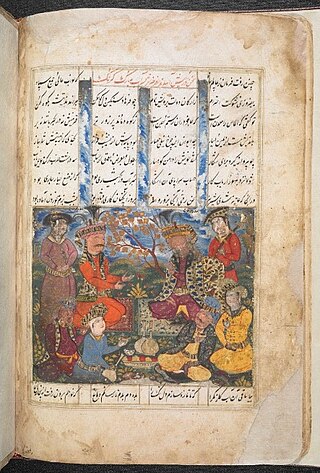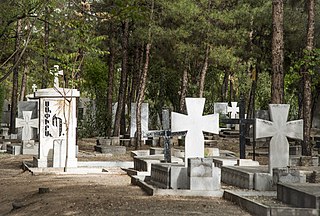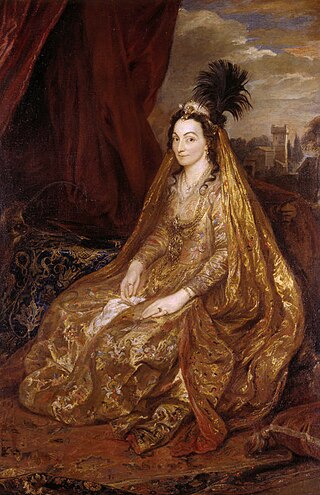
Jean-Jacques Rousseau was a Genevan philosopher (philosophe), writer, and composer. His political philosophy influenced the progress of the Age of Enlightenment throughout Europe, as well as aspects of the French Revolution and the development of modern political, economic, and educational thought.

Abbas I, commonly known as Abbas the Great, was the fifth shah of Safavid Iran from 1588 to 1629. The third son of Shah Mohammad Khodabanda, he is generally considered one of the most important rulers in Iranian history and the greatest ruler of the Safavid dynasty.

Jean-Baptiste Tavernier (1605–1689) was a 17th-century French gem merchant and traveler. Tavernier, a private individual and merchant traveling at his own expense, covered, by his own account, 60,000 leagues in making six voyages to Persia and India between the years 1630 and 1668. In 1675, Tavernier, at the behest of his patron Louis XIV, known as the Sun King, published Les Six Voyages de Jean-Baptiste Tavernier.

Jean Chardin, born Jean-Baptiste Chardin, and also known as Sir John Chardin, was a French jeweller and traveller whose ten-volume book The Travels of Sir John Chardin is regarded as one of the finest works of early Western scholarship on Safavid Iran and the Near East in general.

The Confessions is an autobiographical book by Jean-Jacques Rousseau. In the modern era, it is often published with the title The Confessions of Jean-Jacques Rousseau in order to distinguish it from Saint Augustine's Confessions. Covering the first fifty-three years of Rousseau's life, up to 1765, it was completed in 1769, but not published until 1782, four years after Rousseau's death, even though Rousseau did read excerpts of his manuscript publicly at various salons and other meeting places.

The Muzaffarid dynasty was a Muslim dynasty which came to power in Iran following the breakup of the Ilkhanate in the 14th century. At their zenith, they ruled a kingdom comprising Iranian Azerbaijan, Central Persia, and Persian Iraq. The Muzaffarids were known for their support of Arabic literature. Shah Shoja was a poet and wrote in both Arabic and Persian and was said to be capable of memorizing eight verses of Arabic poetry after hearing them read once. While the Muzaffarid ruler of Kirman, Shah Yahya, commissioned the scholar Junyad bin Mahmud Al-Umari to compile an anthology of Arabic poetry and prose for him

The Hotak dynasty was an Afghan monarchy founded by Ghilji Pashtuns that briefly ruled portions of Iran and Afghanistan during the 1720s. It was established in April 1709 by Mirwais Hotak, who led a successful rebellion against the declining Persian Safavid empire in the region of Loy Kandahar in what is now southern Afghanistan.

French–Iranian relations are the international relations between France and Iran. Iran has generally enjoyed a friendly relationship with France since the Middle Ages. The travels of Jean-Baptiste Tavernier are particularly well known to Safavid Persia. France has an embassy in Tehran and Iran has an embassy in Paris.

Allahverdi Khan was an Iranian general and statesman of Georgian origin who, initially a gholām, rose to high office in the Safavid state.

New Julfa Armenian Cemetery is a historical cemetery near New Julfa Armenian quarter of Isfahan, Iran.

Antoine-Jacques Roustan was a Genevan pastor and theologian, who engaged in an extensive correspondence with Jean-Jacques Rousseau. Unlike Rousseau, he believed that a Christian republic was practical - that the Christian religion was not incompatible with patriotism or republicanism.

Jacob Vernes was a Genevan theologian and Protestant pastor in Geneva, famous for his correspondence with Voltaire and Rousseau.

Mirza Mohammad Taqi, better known as Saru Taqi was a eunuch in Safavid Iran, who served as the Grand Vizier of the Safavid king (shah) Safi and the latter's son Abbas II until he was assassinated on 11 October 1645.
Mohammad Beg, was a Muslim of Armenian origin, who served as the Grand Vizier of the Safavid king (shah) Abbas II from 1654 to 1661.

Teresa Sampsonia was an Iranian-English noblewoman of the Safavid Empire of Iran. She was the wife of Elizabethan English adventurer Robert Shirley, whom she accompanied on his travels and embassies across Europe in the name of the Safavid King (Shah) Abbas the Great.
Jean-Baptiste-Louis-Jacques-Joseph Rousseau, most often called Jean-Baptiste Rousseau or Joseph Rousseau, was an early 19th-century French orientalist.
Jean-FrançoisXavierRousseau was a French diplomat and orientalist, nicknamed 'Rousseau of Persia'.
António de Jesus was a Portuguese figure who flourished in late 17th and early 18th century Safavid Iran. Originally an Augustinian friar and missionary, he converted to Shia Islam during the early reign of Shah (King) Sultan Husayn and took the name Aliqoli Jadid-ol-Eslam. He subsequently became an apologist of Shi'ism as well as a major polemicist against Christianity, Sufism, Judaism, Sunnism, philosophers and antinomians. In addition, after conversion, he served as an official interpreter at the royal court in Isfahan. Aliqoli Jadid-ol-Eslam was one of the late 17th century converts in Iran who "helped reaffirm the Majlesi brand of conservatism".
Johann Rudolf Stadler was a Swiss Protestant clockmaker. He is mostly known for his life in Safavid Iran, where he worked as a prosperous watchmaker. He eventually fell victim to intrigue in relation to the death of a trespasser on his property, and was executed.

Joseph Labrosse, also known under his religious alias Father Angelus of St. Joseph, was a French Carmelite missionary and writer. He played a role in transmitting Persian medical terminology to Europe, and was the first European to make a serious study of Iranian medicine. He also compiled a Persian dictionary with translations into Latin, French, and Italian.














